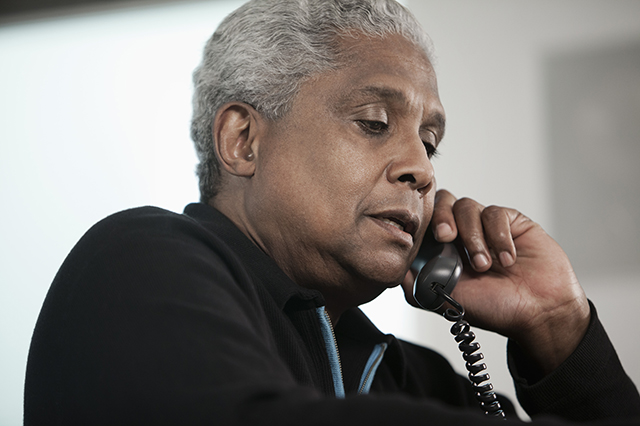The other night, I got a strange phone call. The number had my same area code, and a lot of other digits that were similar to my phone number.
“Hello,” said the voice on the other end. “This is Kate, I’m calling about a significant problem with your health insurance.”
Something didn’t seem right.
“Sorry,” I said, “This seems like a robocall.” I wasn’t sure why I was talking to a robot. Maybe I was too polite.
There was a pause on the other end of the line. Then Kate finally answered. “…No,” she said in a slightly monotone voice. “Do you want to solve the significant problem?”
At this point, I hung up. I couldn’t believe I’d almost been fooled. I should have known better. But robocalls are designed to scare you into answering – into interacting in any way. These scams can be especially dangerous for seniors, who usually haven’t had as much experience dealing with bots.
Robocalls are typically scams targeting seniors. That’s because seniors usually have landlines (which are more susceptible to robocalls), they answer unknown numbers more often (not having grown up with caller ID) and they have less experience with the world of internet scams.
With just a little bit of background knowledge, you can be savvier about how to avoid robocalls and other scams targeting seniors.
Why Robocalls?
The internet has made scammers and con artists a lot sneakier than they used to be. It’s also made it a lot easier to run thousands of automatically-dialed robocalls at once. Don’t have your number in the phone book? It doesn’t matter – that’s not what these phone farms are relying on. They can scrape phone numbers from almost anywhere, across the internet and beyond.
Think you’re getting more robocalls than you used to? That’s because you are. According to the Federal Communications Commission, U.S. consumers received nearly 4 billion robocalls per month in 2020.
Scammers want to lure you into revealing private information. They do this by scaring you into going along with their schemes. Robocalls prey on common anxieties and desires among Americans, like health insurance, COVID-19, student loans, Social Security, tax errors, interest rate scams and get-rich-quick schemes. Robocalls are one of the main ways that telemarketing scammers prey on their victims. They are depending on you being naïve and unaware of their tricks.

How Do I Avoid Scams Targeting Seniors?
Caller ID can be helpful when you’re trying to avoid phone scams targeting seniors. Be wary of unknown numbers. Not every unfamiliar number is dangerous, but there are some red flags you should be looking out for. Exercise caution when the number is unfamiliar to you or is simply marked “unknown.”
Many phone scams rely on “spoofing,” which means that the number you see on your Caller ID might not be the actual number that is calling you. Spoofed numbers will usually look very similar to your own phone number – down to minute differences like one or two different digits. Spoofed numbers are trying to trick you by throwing you off with a number that is familiar to you. They’re hoping you’ll answer – at least out of curiosity, if nothing else.
Not all robocalls are bad, however. Some robocalls could be your pharmacy notifying you of a new prescription, or an automatic system notifying you of an upcoming appointment at the dentist. If you have any doctors, pharmacies or other services that use automated calls, save their numbers in your phone so that you know they’re safe to answer.
It’s not the end of the world if you accidentally answer a robocall – but it does mean you’ll most likely get more of them. Whenever you answer a spam call, you are filed as an “active phone number,” which means that the scammers know there’s someone who will pick up at the other end of the line. Answering robocalls only begets more robocalls.
What if I Answer?
Answering a call doesn’t automatically mean you’ve fallen victim to the scam. When you pick up the phone, just be vigilant.
Phone bots don’t sound the same as they used to. Most of them sound almost like real people. Sometimes they’re prerecorded tracks from actors, making it even more difficult to tell.
The best way to tell if someone is really a robot is to be familiar with what modern phone bots sound like. Phone bots are often incapable of answering questions that their programmer hasn’t anticipated. That’s why, when I said “This seems like a robocall,” Robot Kate said “No.” I wasn’t technically asking a question, and “No” didn’t technically answer. Kate was almost there, but she didn’t quite make sense.
Phone bots will often take a couple more seconds than the average person to reply to what you’re saying. This is because it has to understand what you have said, then choose from a script what the best answer would be. They usually can’t keep up with the pace of a normal conversation.
Do not give out any personal information to a stranger who has called you unexpectedly over the phone. You don’t know what they’re planning on doing with it. This includes your name, birthdate, passwords and other sensitive information.
Avoid saying the word “Yes.” Scammers have been known to record your “yes” response and use it as proof that you agreed to something that you didn’t, like a credit card charge. Do not press any buttons that the bot might ask you to press (like to speak to a human being, for example). It’s a trick.
If you feel that a call is suspicious in any way, go with your gut. The best thing you can do to combat scams targeting seniors is to hang up.
Keep a close eye on your personal information with identity theft monitoring and protection from ProtectMyID.® The Essential plan is free for AAA members. Enroll now.
Learn more about common scams and how to protect yourself. You can report phone scams to the Federal Trade Commission, robocalls and unwanted telemarketing to the Do Not Call Registry and Caller ID spoofing to the Federal Communications Commission.
Have you ever gotten a suspicious robocall? What did you do? Tell us about your experience in the comments below!
72 Thoughts on “Combat Robocalls and Scams Targeting Seniors”
Leave A Comment
Comments are subject to moderation and may or may not be published at the editor’s discretion. Only comments that are relevant to the article and add value to the Your AAA community will be considered. Comments may be edited for clarity and length.


















I set the phone down and let them keep speaking until they hang up.
The robo callers are coming up with better schemes to get you to answer. I get calls that show up as local numbers with names, sometimes legit names, on my caller ID. Once I got a call from myself! So if an actual friend is calling we let the machine pickup and we call out and identify ourselves, if I’m in earshot I’ll pick up or they will leave a message. I’ve told service people and my doctors office, if they are going to call me to identify themselves right away when the machine picks up , if I hear them I’ll pick up or they just leave a message.
The mist fun I had was when they said they were call Ming to arrest me on an out standing warrant. I told them I’ll be waiting on my front porch, I needed a vacation, no one came and I do not know any one who has a warrant for their arrest getting a courtesy phone call. LoL
My Dr. , who was on vacation, called me to tell me that the test results were perfect. However, he called from his private (blocked) number, I picked up and hung up – ooooops. Normally I just let it go to VM but I was standing there when it rang.
When the phone range immediately after I realized it was legit and very important.
Over half of the phones in my house verbally announce the caller ID as well as display the ID on the phone screen. I’ve placed enough phones around the house so that I am usually within earshot of any incoming calls. If the robot voice announcing the calls has trouble pronouncing the ID name I can check the phone screen to see what the announcing voice is trying to say. In any case, if I do not recognize either the verbal announcement or the phone screen Id then I will not pick up the call. Anyone who really wants to reach me knows to leave a message on my answering machine. Most of the robo calls that I get are spoofing numbers nomorobo cannot catch. Nomorobo works only from phone numbers of known robocallers in its database. Spoofing numbers are harvested and used daily by robocallers, avoiding database action. Having the phone ring five or six time a day with robocalls, while mildly bothersome is minor compared to the aggravation of actually, unknowingly, picking up the phone and engaging the robocaller. Most all of these operations would have my number as ‘inactive’
When i receive a robo call I ask who they work for, the address of the company they work for and a phone # I can verify and I will call them back. The next thing I usually hear is a click!
I always receive calls from car insurance companies telling me that my car guarantee had expire my answer to them is always “I don’t own a car. I drive a donkey” click they hang up
Unknown # called & left a message. The first part was garbled then went on to say it was the IRS and that I was facing federal charges if I didn’t call back to clear it up. Knowing it was phone I called back anyway. The girl said “I have you living at ??? In Pennsylvania.” I said I never lived in Pennsylvania. She wanted my address & I promptly said “I’m not giving you my address!” She very as a matter of fact “Them I can’t help you with your problem & now you face charges.” I said “Good. I’ll see you in court!” & I hung up. I immediately went online to report this to the IRS complete with the phone number.
Why not look on your phone and you will see a button that reads “Call Block.” What a gem. When the area codes are from all over the world, I don’t bother but hit the “Call Block” and done, it’s sent to a listing. Easy peasy. I have actually called them back but their number can’t be dialed. I’m down to almost none a day.
While I was reading the various responses concerning scam experiences, I had a call that said it was from ‘the fire department’, repeated twice, and then hung up. This is a new one.
I’m a 72 years old senior. 4 months ago on my cell phone, I received a phishing call which appeared on caller ID as a call from my bank. The name and number were authentic to that bank’s fraud department. When I answered, the young female voice told me that my debit card was used in Florida. Since I live in another state, they were calling to confirm a purchase of $235. The call seemed so authentic that I was hooked like a fish on their line as she told me she would fix the issue and restore my money to my account. She talked very fast and gave me no extra time to think about my answers to her questions about my account details and data including my user ID and password. As she messaged me some codes to give back to her, she told me to keep my eyes on the codes and don’t read anything else. Even though I’m smart enough to know the bank would never ask for that, I surrendered all. The codes were from Zelle as she sent herself 2 maximum allowed amounts to a fictitiously named account from my bank account. At that point I’d finally become suspicious but she quickly rushed me to end the call and told me she’d call back the next day which she did. Of course I didn’t answer and blocked the number. I had immediately gone to my online banking and verified that I’d been scammed. Immediately notified my bank. Had to close all of my accounts and took months to rebuild my personal automatic banking business strategies, and still to this day getting the negative lashback of rejected payments, late fees, etc. I already had problems with symptoms of anxiety further impacted by COVID-19 and this nearly drove me over the edge. There is some normalcy restored to my life and this has taught me a valuable lesson in proceeding with caution with phone calls.
I will answer the phone
“Sheriff’s Department Consumer Fraud Division.”
Usually there will be hang up by the caller.
Good one!
my cell phone does not ring if the number is not in my contact list it just shows up on my screen. if it is in my list it rings normally. i still get emails like that but you can see what calls you want to call back.
Remember, you cannot win a contest you never entered.
Generally these scammers don’t leave a message. Sometimes they hang up right before they think the answering machine will kick in.
When they call you about a credit card, they never say which credit card.
Why would you buy something, especially something expensive from someone who calls you out of the blue?
If I do not recognize the number calling me, I simply do not answer the phone. If it’s a legitimate phone call with a new or unknown (to me) number, they will leave a message and I’ll return the call. I average about five or six unknown, and unanswered, calls per day.